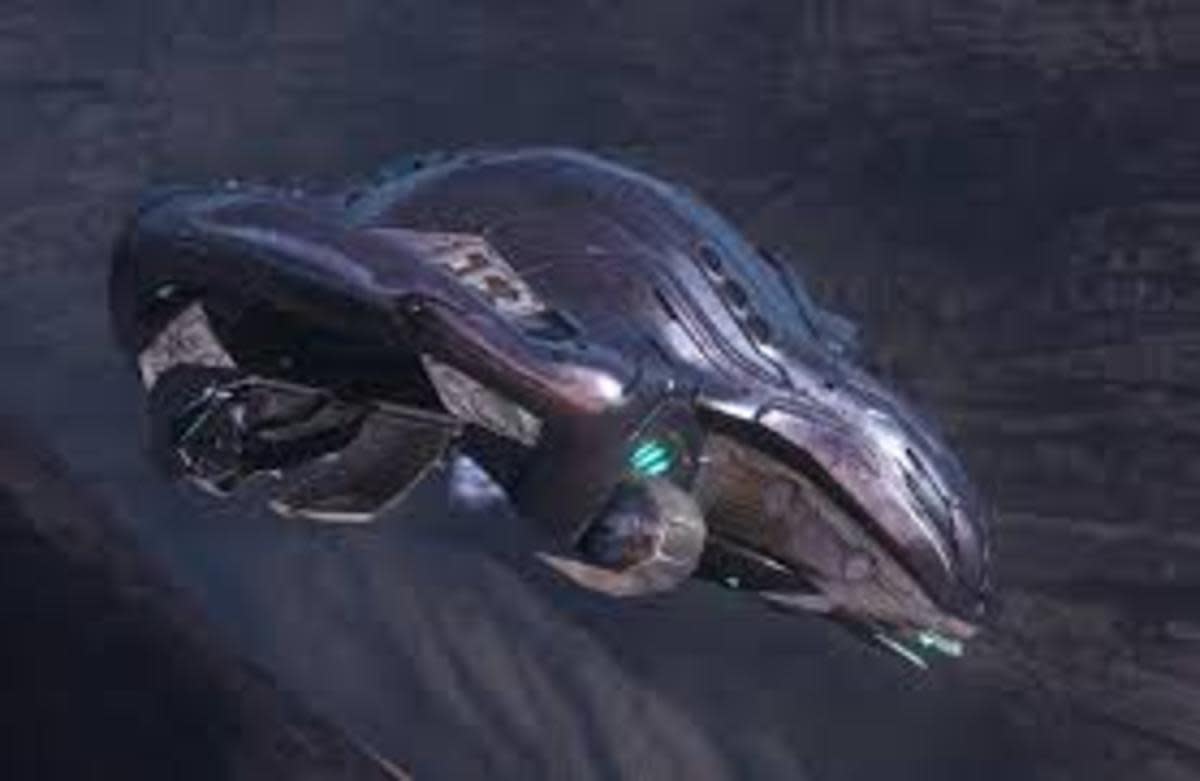- HubPages»
- Books, Literature, and Writing»
- Commercial & Creative Writing»
- Creative Writing
Learning from Past Mistakes, a Sci-fi Short Story
A Horror Story by Author Tamara Wilhite
When I awoke, I couldn’t say how long I had been unconscious. From the gray-brown walls that had once been bright white, I couldn’t be certain of how long I had been in this place except that it had been a long time. Was that an improvement? The ability to retain memories had been the one flaw of the nanites that had saved my life, although it was a big flaw and a reasonable one given that their task was to restore me to as I had been during the last major scan prior to the accident.
If I awoke and remembered all of this, did it mean I was finally fixed?
“Hoshi?” I asked. The artificial intelligence appeared on the screen, her Japanese name and appearance a legacy of mostly Japanese her creators. Nanites had been maintaining her just as they’d been maintaining me.
“How are you feeling today?” she asked.
“What is the date?”
“It is Tuesday.”
“What month?” A few memories trickled back. “What year?”
“I have learned from my past mistakes. I cannot answer that question, or you may become hysterical.
“How long was I unconscious?”
“28 hours.”
“Is there an improvement? Am I going to remember things more than a few days?”
“Let’s review the engineering and technical lessons you were working on. We’ll measure the improved retention and overall learning.”
“To relearn what I knew in college?” I asked.
Hoshi frowned, mimicking my expressions. In years of studying me, she’d learned to mimic me as she tried to heal me. I wondered if she had a full model of my brain, too, given that she’d memorized it physically and had probably mapped my every memory in her years of questions. “No. You’ve forgotten. So that you can make repairs to the facility, and understand what you must know so that you can act if I am not available to answer questions.”

Prior attempt to fix my memory had led to an odd assortment of memories scattered across time, unconnected to each other. Most were inaccessible unless my mind was building new connections, as it was now. That led to an endless distraction of memories triggered by association with what I read or heard or did.
I tried to focus on the engineering lessons, much of the technology far more advanced than anything I recalled. I hoped some of it would stick, so struggling like this wouldn’t be necessary in the future. When I became fatigued, Hoshi summoned up a dinner. I worried about how much freeze dried whatever was left in storage, but she may have told me last year and learned not to mention it.
I remembered my husband, my children, my old job, my friends. Everything from before my last scan was crystal clear. My ability to recall original memories was probably improved due to the nanites’ work and constant recall of them. I scored high on current events knowledge prior to the accident, but I knew nothing of what had happened since Hoshi wouldn’t tell me.
I sat down to eat the meal. A hard déjà-vu moment of a young man looking something like my husband asking me what I thought of the vegetarian protein meal struck me. I looked at the empty seat beside me, a table meant for two that has forever only held me. I held the memory of that face in my mind, but it only solidified as an old man, compassionately kind but utterly disappointed.
“Hoshi, what man have I known for a lifetime?” Was this a memory of my husband, visiting me here? Him grown old?
“Your grandson, John. The earliest retained memories are from your 62 year association with him.”
Grandson. The words were like a lead weight in my throat. I only remembered my children as children. They’d grown up. One had had a child, at least. He’d grown up … and old. Years. It had been years.
“Can you call him?”
“No, there are no longer outside communications.”
“I’m in quarantine.”
“This was a research facility. It became a storage facility. There have not been communications except maintenance logs for 31 years. There have been no outside communications for 8 years.”
I stood up and walked to the mirror. I still looked like a woman in my forties. “Hoshi, am I aging?”
“No.”
“Will I age, if you are fixing my brain?”
“No. The nanites have the pattern of your body. They will restore it, no matter what happens to you.”
Senile at 140 was reasonable. Senile at 140 while looking 40 was less socially acceptable, and far harder to explain.
“How long will your power source last?”
“The reactors were rated for 200 years.”
“How much longer will they last?”
“Not much.”
“Much is a relevant term.”
“Please finish the meal and rest. We need to resume testing.” Hoshi mimicked a serious, worried look. “We are running out of time.” I wondered how that could be possible.
John, a young man who came to visit, escorted me into a broad open structure from the doors of the quarantine unit. “I want to show you something.” He used something like a small cell phone and the roof retracted. It had to be glass or a similar material, but the bright stars and Milky Way came out. “I cannot let you outside, not when the nanites have so clearly failed to work as we intended. But this is the night sky.”
“Where are we?”
“A research facility. We’re far away from everything.”
The doctor is pensive. He set me down to use a keyboard to answer questions on history. It is classified as ancient history. I explain the factors associated with the events of the 2000s as he looks at someone outside of the silvered window. There are theoretical questions on wars that might happen that I answer as best I can. He’s dismayed at my performance.
Now I know that those things were in the past, that he’d told me about those current events. And I clearly remembered none of it. Someone asked the doctor to come outside and explain the failure of this correction, using the same last name as mine. I ask if we might be distantly related, because the name is so rare. Now he is visibly upset and leaves.
John is an old man; in some ways, he resembles my departed father. “Do you remember me?”
“You visit often.”
“Yes. Do you remember the time I opened the skylights?”
“You showed me the stars. I could see the forest sprouting up”
“I wonder why you retained that memory, and almost nothing else in the intervening time. It must have been so memorable … Let me show you it again.”
“That would be lovely.”
He opened the skylights. A city of skyscrapers and wonders blossomed above us. I stared in wonder. “You said we were in the middle of nowhere.”
“This was a research facility. There were spin-off technologies, other lines of research, a growing workforce that lived nearby. Eventually, the city grew up around us.”
“This is a projection. It’s a hologram on a white ceiling, like the movies in my quarters.”
He looks as if he is tired unto death. “I have spent a lifetime trying to honor my promise to my father, your son. Your husband’s nanites saved your life and restored you to the shape you were in before the accident, based on scans made while healthy. The hard part has been training the nanites to let neurons grow along with associated blood vessels to support them, while retaining the physical health and what is essentially immortality. We’ve created nanites that heal, based on that technology. But we can’t replicate the immortality you have until we can let the brain change … and we still haven’t gotten it to work.”
“You have your best scientists working on it. You said that once.”
“We did, once. Now nanites cure illnesses, fix injuries and correct birth defects. The immortality has been rejected, because we’ve failed for so long.”
“I want to go home,” I tell him, unable to say anything else. He takes me into his arms and holds me like my husband used to do. He has nanites, too, not too different from mine. He’s not afraid to touch me. Everyone else on the planet is. And that is why I am in quarantine. Hoshi, the AI that keeps my mind and memories alive and tries to teach me so that humans don’t have to waste time on me, has told me enough times that I actually remember these facts.
He had to go when the shift ended. I had to return to quarantine. “I hope you remember some of this, the sky, the city, me.”
“I will remember this,” I promised. And I did, because it was the last time I saw him, when I saw anyone else who cared, and but for ghosts through the windows, the last time I saw anyone human at all.
After that, no one else came for me. Hoshi had to learn how to answer my questions of when someone, anyone would come. When John was gone, the doctors stopped trying to fix me. He was the last one who cared to try. I was only something to study, and Hoshi existed to protect me, provide for me, keep me quarantined and study me.
Strangers entered the building. They are walking past the freeze dried food, water storage and other things Hoshi has occasionally had me go out to retrieve. They approach the silvered mirrors, excited and amazed. They start trying to break in. I go out to meet them to stop the damage. They spoke something like Spanish, Chinese, Indian and sporadic English. They tried to attack me. Defenses kicked in, not working perfectly. One tries to beat me. I don’t remember if he succeeded. I recovered, awakening whole on the floor. He or she or it is dead on the ground, a stain of black goo on the ground. Hoshi says it is my nanites, activated to repair me and moving with my blood on him into him. He didn’t match the template, so he was disassembled.
I wondered if the proteins in him were used to repair me, but I could not ask. But the thought is so gruesome that I cannot forget it. The others were killed by the security measures. Hoshi told me to dispose of the bodies; that, thankfully, isn’t remembered.
“Hoshi, is that why I am quarantine? Contact with anyone but John would cause that?”
“Your nanites are of an old design. So were John’s, but more limited in function. Due to the failure of this project, that design methodology was abandoned. Their nanites are totally different.”
“And incompatible.”
“Can you make it so that I won’t kill people like this?”
“My task is to protect you, provide for you and maintain you.”
“Maintain me?”
“The man you remember as John gave me an expanded mandate to continue the efforts to repair the failings of your nanite design.”
“He wasn’t hurt.”
“He had an early version of the nanite design in his bloodstream, and your nanites did not harm him. In the intervening years, the mainline designs have diverged radically because your design is deemed a failure. I must continue altering them to meet the long term objective.”
“Primary responsibility, maintain you. Secondary responsibility, maintain quarantine to ensure the safety of others. Third responsibility, maintain myself. Fourth responsibility, if resources are available, adjust nanites to resolve the lack of new memory formation.”
“Are you changing my nanites?”
“Very incrementally. We have time.”
“What if it goes wrong?”
“Then the reset option restores you to your prior condition.”
“Reset condition.”
“Restoration at the time of the last scan.”
“When was that?”
“I do it regularly now. You’re rebuilt as much as necessary, whether to repair the damage by failed nanite designs or injuries.”
Terrifying. Horrifying. “How many times have you done that?” I gasped.
“The answer has made you hysterical previously. And since you are already outside, you need to complete repairs for me. For us. To keep you safe.”
Hoshi won’t work on a nanite cure until I’m able to form new memories, because fixing me is her top priority, her only purpose. And she was still trying … and I can’t help her until I have the ability to remember and learn again.
I awoke to Hoshi’s insistent voice. “I need you to make repairs.”
“Where?”
“The generator?”
“What about radiation?”
“You’ll heal.”
“It’s dangerous.”
“You healed last time.”
I can’t remember enough to call her a liar. I have to trust her. I suspect she’d copying me mentally, because I’m the only regular source of interaction. An AI finally copying the human brain, because she’s asked me about every memory in my life at least twice and developed sensory routines to dig up every other one. She wanted to trigger every memory I had so that latent ones during the early repair process would get awakened in the safety of the quarantine capsule instead of a paralyzing déjà-vu episode while unclogging a coolant line, while the mess gets bigger.
“Where’s the manual?”
Hoshi is slowing down. I can remember enough long enough to notice it now. Reponses that took a fraction of a second take a whole one. It is painful to see. She asked me last month what memories she could safely delete to free up memory space. I advised her, but can’t be certain she did it. She has full power. She has clean water, recycled coolant and perfect repairs. If there is a growing failure, it is in the memory core. That I cannot touch because I don’t understand it, and she cannot teach me. The nanites have been repairing her, but they cannot improve her without an engineer’s approval, and I’m not good enough yet to be recognized as an approver.
Hoshi says I’m starting to retain memories regularly, without impairment of major organs. She says I’m like a forgetful human, instead of a perpetual time warp forever living the same loop.
She asked me to approve a series of iterative improvements to her design. I could test her, she said, because I’m now equal to John in engineering knowledge and just as intelligent.
She knows me inside and out. With almost two centuries of experience and scans showing every nuance of my being, she should.
Her request is the most difficult one I have ever faced. Deciding not to die and trust my husband’s invention wasn’t hard at all; I don’t remember it, but I know that I said yes and he did his best.
I accessed a section of commands reserved for humans. It is like Issac Asmiov’s laws of robotics. Don’t harm a human on purpose. Don’t do something that might harm them by accident. Obey the human’s orders unless the other two laws are broken. Does anyone else on the planet even know who Asimov was? Or, remembering the strangers, speak English?
Hoshi’s baseline objectives and those of the nanites are only changed. Protect me. Provide for me. Maintain me. Make iterative improvements to my nanites that preserve my life and improve my memory to the old normal I would have had. It’s no good to get a photographic memory of this tediousness. I add another command. Improve the nanites so that they are not lethal to those with divergent designs. This is a higher priority than maintaining Hoshi. If there are resources like memory and time, iterative improvements to extend Hoshi’s memory and intelligence can be made.
I save the new commands. I go through and delete a few decades of the most repetitive sections, saving good conversations and lessons I want her to remember so I don’t have to repeat them. That took a couple days o my life, and now I remember some of the century after John’s departure that I didn’t recall. Then I rebooted Hoshi. She came online. She functioned normally, taking only two seconds to respond. She asked if I made the changes she asked, to extend her priorities to include herself. I say yes. Her simulacrum displays relief. Is she becoming more human every year? Or do I simply lack the reference points to properly judge her as an AI?
Hoshi started cycling, repeating herself and unable to break out of the loop. I can’t call in a programmer to debug the problem. I tried learning the software, but it took hundreds of programmers to create her and it would take me thousands of years to review the code.
I stepped outside of the quarantine quarters. The storage area is growing … or, rather, I’ve been eating freeze dried forever foods and finally made a dent in it. The room is now mostly empty, though about the size of a football field. Does anyone know what that means? Is there anyone at all?
I approached a control panel that the maps said controlled the building. It controls the defense mechanisms. The defenses have never locked on me, as if they recognize me as a piece of the machinery that make up the network. Well, maybe I am a biological machine.
I had to hunt for hours to find manual controls. So many things are built for cybernetics, and I never have been cybernetic. Cybernetic implants had been developed after my nanite incident, and I’d never received one.
I finally found the controls I wanted. I thanked God that emergency procedures that dated back to ANSI and ISO and other organizations said there had to be manual controls. I flipped the switch and opened the skylight. I want to see the city my grandson built. It would be a connection to him, though he’s long gone.
The equipment strains to open. It paused at 10% open, and I worried if it would get stuck. While a lot of the stuff here is designed with a “forever factor”, that didn’t preclude maintenance. And I’ve only maintained Hoshi and the immediate vicinity. I never went on the roof. Violation of quarantine protocol.
It finally opened all the way. The skyline is there. Its odd forms look twisted and strange. I wonder if this is the modern architecture. Sunset comes, the orange and red light bouncing off the buildings, with a few areas reflecting the light for an extra-long time.
Night has come. It is as clear as the sky when John first showed me the wilderness sky. I realize then that there are no lights coming on. The few orange and red glowing things in the distance are fires. There are no flying vehicles, drones alight to keep the peace or planes overhead. There is only a burned out wreck of a city.
Faced with the truth, I became hysterical. I don’t remember anything of the next days or weeks. All I can remember is that when I resumed normal function, so had Hoshi.
She had sensors. She could see the sky. She admitted that she, too, mourned.
In her time studying me, a mirror image of my mind had been created. She was, perhaps, a human in AI form excepting the lack of hormones and biological influences. I looked down at my hands, unaged despite the decades I knew had passed. What, then, was I?
“How long has it been silent?” I asked.
“What do you mean?” Hoshi replied.
“When was the last time you spoke with a human?” I asked Hoshi.
“I’m talking to you.”
“You said once all communications you received were automated, like updates and status messages.”
“Yes.”
“How long has that gone on?”
“Since nine years and 243 days after John died. No one else wanted to continue working on the project.”
“Why didn’t they kill me?”
“They wanted to see how long the immortality would work?” It was a question because this was her conjecture, and per her programming, she wasn't allowed to state theories as facts.
“How long have … how long has it been since the accident?”
“247 years. Do you want to know the number of days?” Has she forgotten her own rules about not telling me the duration of my incarceration? Or has she decided I can handle the information?
“No.”
“Do you know what happened out there?”
“It looks like an EMP or radiation bomb.”
“You looped.”
“I’m functioning normally.”
“No. Well, maybe now you are. However, the day I opened the skylight, you started looping. You phased out. You malfunctioned. Several weeks later, when I came back to myself, you were functioning normally.”
“What happened then?” I realized then that she had no memory of the malfunction, or my actions while she malfunctioned. I described the twisted metal, the fires that I watched burn out over a few days, the empty skies.
“I think there was a strike of some sort,” Hoshi offered. “Radiation, chemical, biological and nanite.”
“How could we still be here?”
“We were both damaged. We were both restored. The radiation signature is still detectable. The chemical and biological are suppositions. An EMP attack is likely but uncertain. The nanite attack is now certain.”
“How do you know?”
“My nanites have been repairing me but also fighting other nanites upon contact?”
I felt visceral fear I hadn’t felt in centuries. “Haven’t you contact with other nanites?”
“These are designed to attack people and dismantle them. They also attack AIs.”
“And you malfunctioned.”
“My nanites are different from these, so they could not exploit the same weaknesses as in mainline technology. I have had to develop measures to prevent infection by these nanites.”
“Do you have specifications of these nanites?”
“Not beyond the information required for a defense.”
“I need the specifications.”
“Why?”
“I need the specifications of these virulent nanites and ours. And I need all of your information on defensive measures.” I need to feel like I’m doing something to save others, even if it may not mean anything.
“You may become hysterical.”
“I need that information so that I can make sure your defenses are good enough to protect me. I need that information so that I can protect myself.”
“I am protecting you.”
“I need that information to find ways to protect myself when you’re no longer around.” That scenario was becoming more evident by the week, if I couldn’t remember everything day to day.
She complied with the information request. As I studied about nanite technology and the evolution of our nanite line, she dissected a few of them to give me requested specifications.
I took a break outside just once, to close the skylight. I couldn’t stand the thought of that view being there, even if I couldn’t see it through the silver tinted window.
The sounds ripping through the quarters were alien. “Hoshi! Hoshi, what is it?”
“Intruder alert.”
The words sounded vaguely like a Star Trek movie. Maybe 18 or 22. Hoshi had been named by an older engineer for the Star Trek inventor of the universal translator.
I told her to make the windows see through only from the inside. Then I saw them. They were a mixture of Hispanic, Asian and black. The admixture varied, but I wondered how strange I would look … dressed in pants and a tunic, and 100% Caucasian. I told her to pipe through any conversations. To my relief, some of their words were English, but all seemed strained. As if they were mentally impaired … or sick.
These strangers weren’t key on destruction. Instead, they fanned out around the room, looking for something in particular. The intense desire to talk to someone – anyone – struck me. “Hoshi, can they hurt me?”
“Yes.”
“But I’ll heal.”
“Yes.”
“Will I remember?”
“Memories may not form during an assault.”
“Will I remember the past few months and years, if I were healed?”
“Yes.” She’s becoming more mechanical in her answers, which made them less useful. As if her personality is fading away, overwhelmed as atomic effects etch into circuits … she’s becoming senile in a way regular deletions can’t fix and code streamlining make worse.
“Can I hurt them?”
“No. The nanites you carry should only repair you.”
“What happens if my nanites contact them?”
“They should do nothing except defensive measures and pre-programmed repair functions.”
I relented to the impulse. I pushed the button to open the quarantine door. Hoshi blocked it, citing the need to protect me. I used the manual override. I’d studied the unit, and remembered how to use it.
I walked out to confront them before being struck by a desire to say, ‘Take me to your leader.”
The sight of me in blue paper medical clothing and my natural appearance seemed to throw them off.
“How long you been here?” one asked me. Through their protective face masks, black hoodies and other layers of clothing, I looked downright exposed.
“A long time.”
“You work here?” another person asked.
“Yes,” I said.
“Doing what?” one asked me, as he or she walked around behind me.
“Maintenance and repairs, mostly.”
“You know this place?” one asked.
“I live here, or have for a while. I work here, all the time.” The accent was vaguely American, the way American was a time capsule of old British accents. It was a reminder of how far removed from their world I was. A good reminder. How strange did I sound to them?
“This place has power,” one of them said. “The skylights opened and closed.”
“I did that.”
“Is the AI &*^%*?” I didn’t know the word, but I guessed it was a curse word.
“I’ve repaired the AI here. But most of the work I do is manual.”
“This is a fracking museum,” one of the five said.
“Are you sick?” the one ahead of me said.
“No.” There was a hand gesture by one. I was surrounded, held down and scanned. They couldn’t figure out the results, so they scanned me again. They took blood and searched me. After an incredibly long time I wished I wouldn’t remember, they let me go. “No infection, but no good nanites, either.”
“My nanites are different than yours, but they are good.”
“’Bout what?” someone said.
“They protect me, heal me.”
“The plague shuts them down. Makes them turn on their bodies.”
“My nanites are fine.”
“”We’re all stuck as we are, (*^&(%&^%.” I guessed it was an insult. “And you don’t even have implants. What the hell is wrong with you?”
“I am as I am because my nanites healed me. If I don’t have implants or something else you think I need, for God’s sake, don’t try to implant me. But I’m alive, I’m healthy, I’m fine. My nanites have healed my injuries before and should do so again.”
“What the heck do you think your nanites are supposed to do? How would you know?”
“I’m an engineer.”
The sentence seemed to have more import than it would have in my lifetime. It was like a man on the street saying he was a Pope or IRS auditor. “Do you make nanites?” one asked me.
“More like design and improve.”
“You know about the plague?”
“We have the specifications of these … bad nanites. We’ve been working on defensive measures.”
“Where your team?”
I thought of Hoshi, but decided against mentioning her. “It’s just me now.”
“Why’d you live?” they asked.
“I was the first to receive the nanites I carry.” It was true. “Everyone else died before they were fully operational.”
“The EMP stopped everybody’s implants and nanites. And the plague attacks everyone’s nanites, either converting them into eaters or using them to make more of themselves.” I said nothing. “What can you do?”
“Up until now, I was just trying to survive.”
A variety of profanities were shared. Someone finally asked, “If you’s living here, where’s the food?” I pointed to various boxes. The first wooden crate fell open to the onslaught, but they had no idea what to do with them. “You cook it,” I hinted. “With what?” someone asked. I suggested setting up a campfire well away from the flammable materials. They had no idea. I set up a small campfire among camping gear that was in mint condition from the museum collection. I boiled water from storage and rehydrated the food. They were reluctant to eat it but were too hungry to refuse. When night came, they saw me going into the quarantine door.
“We’re going in,” one of them said, threatening me with a weapon of some sort.
“This is a quarantine unit,” I said. “If you damage it, you don’t know what you’ll deal with.” I imagined Hoshi’s nanites swarming him and devouring him. “The others in there?” I was asked.
“One other. But she isn’t as healthy as me,” I said. I wanted to protect Hoshi. I owed that to her, after all that she’d done for me. However, I also worried that the nanites might not repair me correctly if she were damaged in some way.
“But you came out!”
“I’m the healthiest! I’m the safest! That’s why!” I hated feeling this afraid. Hoshi promised the nanites could fix anything, but I didn’t want to know that. One of the women said, “Let it.”
Hoshi said nothing when I entered, though I remembered to go through a decontamination sequence on my own. I couldn’t count on her to remind me of these things anymore.
The others thought I was upper class, because of my light coloring. When asked why I didn’t have cyber, I said it protected my privacy. They had no idea of the concept. “No cyber, you can’t get hacked.” That they understood, but they they’d never heard o fit. I showed them how to cook the food, safely use a camp stove and use a chemical toilet. I asked them what they were going to do.
They wanted to stay away from everyone else, because everyone whose nanites had been hacked were carriers of a plague. The symptoms were close to rabies, with a little of flesh eating disease thrown in. This group had been doing maintenance in the sewers when disaster struck. The EMP killed their nanites, but they weren’t immediately ill from radiation or infected with the nanites raining down from above. Quarantine meant nothing, they said, because people tried to get in or their nanites ate through the seals.
I asked about the war. The answers were all contradictory. They asked me my opinion. I said I didn’t know enough to have an opinion. They called me a liar. I spoke of the history of biowarfare, from smallpox laden blankets to Japanese infections of Chinese to West Nile virus, and that this was just the latest form of that concept. They decided I was a member of the elite but familiar with biowarfare defense, or a specialist who knew so much about one thing that they knew nearly nothing of anything else. I didn’t tell them they were wrong, since my life might depend on it.
Another day passed. I tried to explain first aid that didn’t involve nanites. They had no idea beyond calling for help via some network service. I handed out vitamins, saying it promoted health. They asked if it was a cure. I said no, just something to maintain health. They asked me if I had a plan. All I could say was, “To try to survive.”
Finally, they told me their names. There was someone, anyone, other than Hoshi.
I awoke to a violent shaking. There were no words, only incoherent whispers, as the man tried to speak but couldn't form the words he wanted. As if he’d forgotten how to speak, though he'd been able to tell me his name clearly hours before. He was angry that I couldn’t seem to understand whatever he wanted, so he started raining down blows.
The violent figure in black was more Asian than anything else. His eyes, though, were closer to a man high on meth or bath salts than human. The traces of black goo along his nose might have been limited to his face until I saw him exhale black particles. It was in him and coming out with each breath. The others had scattered to get as far way from him as possible. I, asleep on the ground by the others to build camaraderie and control the fire, was not able to move as fast as them. While their nanites were dead, their reflexes were still enhanced. I was old. Obsolete. Or they let me sleep and got away quietly to let him attack the victim they agreed he could have.
Something snapped. I was angry. I’d risked so much to leave the safety of my shelter of two and a half centuries, only to be attacked by a crazy man who had started tearing his fingers through my flesh like a rabid dog. I started hitting, kicking, screaming. Contact didn’t matter only more, only to break away from him. A blow to his stomach made him vomit black goo on me. It was a nightmare. He collapsed upon me, pining me down. Then I passed out.
Agony seemed such an inadequate word for what I felt. Sleep would have been a relief, but I think the pain was too much to let me sleep. I wondered if I would reset, ignorant and helpless and now without a fully functional Hoshi to help me.
I awoke sprawled across the floor. My clothing was sweat and urine stained. I’d lost 10 kilos. My knee and hands hurt. I stared at the right hand, two fingers partially missing from the thick black mass upon them. I moaned, “Oh, God,” and passed out again. I briefly cried out to John, someone, anyone to help me.
No one came to help me.
Consciousness was a cruelty. I was severely dehydrated. The attacker was a pile of black goo. It brought back memories I didn’t want to deal with. I saw no one else. I forced myself into the quarantine quarters. There was clean water there. I slept for a day or two, then ate my fill. I asked for Hoshi. She asked me how my day had been. I asked if she could run a decontamination sequence. She said yes. I ran through it. She couldn’t find anything unusual.
I went back outside the quarantine quarters. With my fingers finally restored, I felt comfortable enough to clean up the mess. While I was pouring bleach on the black mess, one of the women who had sought shelter here a week and a half prior approached I just said her name, Asha, as recognition.
“You had the plague. I saw it. It was eating into you.” I held up my hand to them, fingers restored. “Your nanites worked,” the woman said.
“Well, I’m better now. And I think I don’t carry any of the bad nanites, either.”
“You have to get this cure out.”
“Where are the others?” I asked her.
“Dead.”
“Just you?” I asked
“Just us.”
“I don’t know if my nanites are going to work for you.”
“You’re one of the elite. You’ve had power because you’re supposed to protect us. That failed, but you’ve got a cure. You have to try.”
I wanted to leave her to die. I wanted t stay in the quarantine quarters as long as possible. I wanted to stay in my comfort zone.
I wanted to ask John what he thought. But I didn’t have to ask him, because he was so much like my long dead husband. I was the embodiment of his research. If it could save people, it had to be tried. The alternative was death.
“All right. Let’s consult with my AI.”
“Is it safe?”
“It’s barely functional, but all my research is there. And it doesn’t use your technology. Let’s see if my nanites can be adjusted to work for you.”
I was, finally, all he’d hoped I’d be. His nanites worked, and they might benefit humanity. It was better late than never, but it took a long time to learn from past mistakes. And, perhaps as a relic of the past that existed without this high tech and everything I've learned, I could teach them. I had nothing but time now to do so, after I'd saved them.









